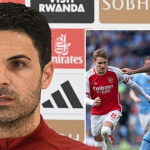Former Manchester City goalkeeper Alex Williams has published a book detailing his career on and off the pitch

One of the first black goalies among the modern elite, Alex Williams has outlasted most pros in his career. Adding to the daily racism he faces from neighbors and team-mates – whether intentional or unintentional – the Manchester City goalkeeper has ended the horrific abuse against Everton, where some fans slammed him in a nod to members of the Ku Klux Klan Crosses waved as he grabbed the goalposts at the far end of the field.
Despite all the unacceptable behavior Williams faced, the only thing that brought down the six-foot-tall giant was an injury; an injury that ended his career and prevented him from functioning normally.
Playing with debilitating leg pain from an undiagnosed herniated disc in his spine was bad enough, but recovering from the injury that eventually ended his career at just 25 was more difficult.
“When 1986 started I was depressed and getting back to football was high on my list of priorities”; she said in her new autobiography, which was published this week.“Although the operation was successful, my body was injured. I left the hospital with a bad limp.
“I also have scars on my psyche, but they will heal with time. I was concerned about my general health and wondered if I could resume my daily activities. “I had already overcome adversity on the racial front, but this was a new challenge for me.
I was tired for a long time and had to dig deep. “Alex Williams, normally confident, was troubled inside.I couldn’t leave the house, which gave me ample time to contemplate the life that lay ahead of me.
A must-read, not just for city fans. The book reveals the tensions and politics that reigned within football clubs and culture in the 1980s – a particularly volatile period when racism and hooliganism was rampant against a backdrop of social and economic inequality.
Williams takes us on the pitch, into the dressing room, and talks about the significant events of his career, only to reflect on how his perspective on them has changed over the years; There is also testimony from several visitors, including Greater Manchester Mayor Andy Burnham, who witnessed heinous racism towards the town’s bouncer in Goodison and what he saw prompted him to take action later in his life.
Although his career was horribly cut short, I still have fond memories of the off-field goal at Anfield that left an indelible mark on Ray Wilkins and his key role in City’s return to the top flight after relegation.
Although Williams was honest enough to admit his early problems after retirement, he also worked tirelessly to help others.
The longtime member of Show Racism the Red Card is leaving City for good this month after 40 years of service during which he has been extremely proud to welcome goalies like Kasper Schmeichel and Daniel Grimshaw to the team, making City a global player in the community too . Charity projects around the world.
These contributions saw him awarded an MBE in 2002 that allowed him to take his wife and also his mum – part of the Windrush generation like his dad who came over from Jamaica to Moss Side in the late 1950s – to Buckingham Palace. Having been idolised by the Gallagher brothers when he was coming through at City, his career was then studied by Pep Guardiola when he arrived in Manchester in 2016 as part of his education to understand the identity of the club.
Williams is leaving City in the Community on a high, and has also added some more memorable moments in handling Premier League medals out to Erling Haaland and Co. in May before partying into the night with them in Istanbul after the club’s first Champions League success. With more care given to looking after players now both physically and mentally, as well as numerous black goalkeepers in the Premier League, it is also to be hoped that the two huge issues encountered by Williams are smaller thanks to people learning from his experiences.
“It didn’t surprise me. There was a lot of racism but not just that. It has changed a lot. It was as much a shock to the fans as it was to the players and public,” he said, reflecting on his career.
“Once I established myself after a year, things became a lot easier because people knew who I was. They knew if they played City I’d be in goal.
https://get-latest.convrse.media/?url=https%3A%2F%2Fwww.manchestereveningnews.co.uk%2Fsport%2Ffootball%2Ffootball-news%2Fman-city-alex-williams-guardiola-27590592&cre=bottom&cip=22&view=web
“My attitude was that you’ve got to try to play well and win the fans over. It wasn’t nice to hear certain things. You try not to take that personally.
“What I found was that, in most cases, I ended up playing that well that I actually changed the attitudes of the crowd. Certain games I remember – West Ham away, Leeds away – I was actually applauded at the end of the game. Not just for my performance but dealing with what had been said.
“I think the biggest change today is most teams have a lot of black and ethnic players where they didn’t before, but I think players’ attitudes have changed as well. They’re all very supportive now to the sensitivity around racism and all the other issues which are associated with that.
“If anything happened today, the first people who would stand up and say this is wrong are the players. There has been a big change. There’s a long way to go, and people like Kick It Out, Show Racism the Red Card, PFA and Premier League’s No Room for Racism campaign are helping and they are slowly changing things.”
You Saw Me Standing Alone is available from www.alexwilliamsbook.co.uk for £15. Part of the proceeds will be donated to City in the Community.






